Could One Fine-Dining Restaurant Help Create a Renaissance in Lee-Harvard?
by Annie Nickoloff | Jan. 21, 2025 | 10:00 AM

Matthew Chasney
Kolnita Riggins-Walker exits her kitchen and steps to a podium, quieting the chatter and clanking forks of the politicians and nonprofit organizers who fill the dining room at Doc’s on Harvard.
She’s relaxed, wearing a spotless white chef’s coat with a blue marker tucked into its sleeve. From behind a pair of butterfly frame eyeglasses, she scans the crowd, looking for her husband, Bill Walker, and finds him near the back of this restaurant in Cleveland’s Lee-Harvard neighborhood. They lock eyes and smile. Behind him, through the glass door, peeks a bright mural memorializing their son Trent, painted on the brick wall of the patio.
The chef motions to the kitchen, calling out her entire crew. Attendees cheer for the small team. They cheer for the upscale ambiance, for the careful menu of internationally infused American eats — for the history steeped in this very building.
“Thank you,” she says with gratitude felt by each member of the crowd.
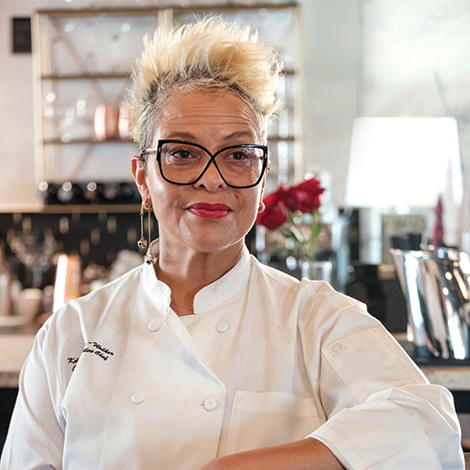
Doc’s on Harvard sits in a squat brick structure on Harvard Avenue where the busy intersection with Lee Road segues into a tidy grid of post-World War II brick homes. Outside the window behind the podium, cars flow through this main neighborhood corridor. A steady stream of customers move in and out of the Lee-Harvard Shopping Center across the street.
“A Suburb in the City,” as it’s often called, the Lee-Harvard neighborhood was once a part of the Miles Heights suburb before it was annexed into the edge of Cleveland in 1932. During the Great Migration in the ’50s and ’60s, the area became an important economic center for African American Clevelanders. Residents overcame discriminatory real estate and banking practices such as redlining thanks to the community’s Black-owned investors and companies.
The first African American family moved into the neighborhood in 1953, and by 1965, nearly 75% of the population was Black. Homeownership rates were higher, and the median income level was nearly double the rest of Cleveland. Yet, a lack of attention from city programs, population loss and crime led to commercial blight in the 1980s. The area fell on hard times.
Engaged community members kept Lee-Harvard from falling into total disrepair. Like plenty of surrounding suburbs, the neighborhood has retail, high homeownership rates, a recreation center, schools and parks. It has a volunteer-run police force, locally owned markets and an active community development center that was key in working with the city to create a master plan, which envisions new branding, businesses and energy defining this part of Cleveland.
Filtering into that plan are two multimillion-dollar city projects: Mayor Justin Bibb’s $15 million Southeast Side Promise and the city’s $10.6 million Middle Neighborhoods Initiative. Both aim to revitalize Cleveland’s more financially overlooked areas, like Lee-Harvard — a community developed primarily by and for Black Clevelanders.
“These are neighborhoods that are on the edge, between decline and prosperity and, without investment, could decline, but they don’t attract a lot of attention,” says Josh Jones Forbes, the marketing and communications director of Cleveland Neighborhood Progress. “They aren’t hot markets, so it takes an intentional effort to invest in these neighborhoods.”
RELATED: Cleveland's Outer Neighborhoods Could Be The Key To The Future
One thing Lee-Harvard needs to become Cleveland’s next buzzy community is a sit-down restaurant. A place to celebrate and grab a bite. Maybe, even, a date night destination.
“We know that one restaurant, one art gallery, one amazing small business, could change the trajectory of a community,” Bibb says. “Think about what chef Michael Symon did for Tremont, and his first restaurant was an anchor that really helped propel Tremont revitalization. The same can be true for the Southeast Side.”
Doc’s on Harvard, which opened in April and had a grand opening in June, hopes to be that resource to the neighborhood. Today, it’s not only the sole fine-dining restaurant in Lee-Harvard; it’s one of the few sit-down restaurants in the historic community.
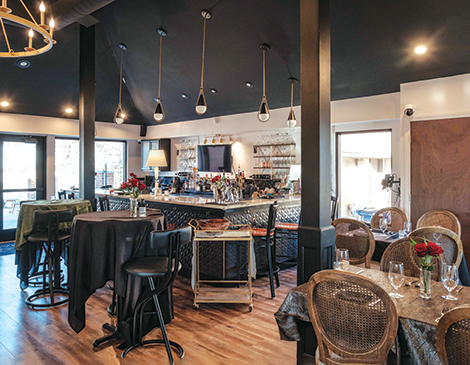
For Kolnita, the journey to get here is lifelong, and she can see her family, her inspiration, in every nook and cranny of the restaurant. This space, with its clean blush walls, marble bar top and gold light fixtures, is still hard for her to believe. She built the contemporary American menu by focusing on local ingredients and splurging on top-notch cuts of meat and seafood. She and Bill welcomed today’s visitors through the front glass doors, offering tastes of small bites like the restaurant’s crunchy Riggins’ Southern fusion rolls, a crowd favorite inspired by a recipe from Kolnita's uncle Ed Riggins.
These local leaders are here and exuberant today because they hope Doc’s on Harvard can be more than a restaurant. Maybe it can be a turning point.
The coffee grinder hums inside Doc’s before it opens on a recent Friday afternoon, audible above a playlist of light classical music. Kolnita and Bill are at the bar, discussing their children and last night’s Browns game. Kolnita dumps the grounds into an espresso machine and then steams milk into the hot, pungent coffee. She sets the lattes down on the bar counter in front of Bill and settles next to him on a bar stool, wrapping her fingers around her mug.
Coffee is a love language for the couple. In the late ’90s, Kolnita worked at an Arabica Coffee House in Shaker Square. One day during a busy holiday season shift, she struggled to find somewhere to sit during her lunch break in the packed coffee house, when she saw an open chair at a table, across from a man behind a newspaper.
That man was Bill Walker.
“He was such a gentleman,” Kolnita remembers. “He said, ‘What time do you get off? Can I come back and see you?’ And I told him, and he came back, and it’s been history ever since.”
“Best cup of coffee I’ve ever had in my life,” Bill says, smiling.
Back then, as always, she leaned into providing the comfort and warmth of hospitality. She grew up in her mother and grandmother’s kitchens. They were places where family and friends came to get their hair pressed and curled, their ears pierced or to just sit at the table and eat. It was where a young Kolnita, just tall enough to see over the table, watched her grandmother's hands craft dinners from scratch, serving them on china to her family — even after cooking full time at local hospitals and schools.
“She cooked with so much love,” Kolnita says warmly.
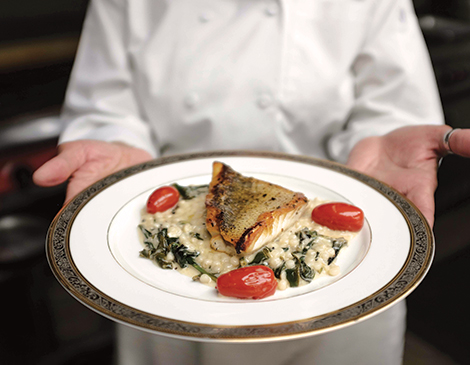
Kolnita started her first hospitality job at 14, busing tables at Vernon’s in Shaker Square, followed by work at Arabica, Eddie Sand’s Blueline Cafe and Norton’s Cafe. Eventually, she studied culinary arts at Cuyahoga Community College and worked under Sergio Abramof at Giovanni’s, with other stints training at the Ritz-Carlton Downtown and at Classics. She only took jobs at restaurants she loved.
In 1998, Kolnita and Bill married and relocated to Toledo for four years. While their five kids were in Maumee Valley Country Day School, Kolnita had the opportunity to launch her Classic Cuisine catering company for a Black alumni event. It was a welcome pivot for the classically trained chef, who found herself wanting more respect during long hours working in professional kitchens.
“I found, in my experience, that as a Black woman, I didn’t like the way that I was being treated,” she says. “I wanted to do something about that. I wanted more flexibility to create what I wanted to create."
The catering company grew by word of mouth; Kolnita says the upscale concept serviced CEOs, art galleries and doctors’ offices. While living in California for a year, she catered for employees of tech brands like Apple, Thumbtack and Recharge, and Captain Kirk's Sailing, a yacht chartering company.
Kolnita and Bill returned to their hometown of Cleveland during the pandemic, after 20 years living in Chicago, to help care for Bill’s dad during a time of isolation. “Doc” William Walker ran a dentistry practice in the red brick building on Harvard for 65 years. Dentistry was an act of service for his community; he never turned away a patient for lack of funds, Bill says. William furthered that service when Mayor Ralph Perk made him the director of Model Cities Dental Clinics, which offered free and low-cost dental care to Cuyahoga County residents for two decades. And he continued to work, even when his office closed a few years ago during the pandemic and as he faced a prostate cancer diagnosis.
One day, while checking the mail at the empty dentist office, Kolnita found herself suddenly jolted into a new path for the small, stately building.
“Literally, God took me in an open vision. I stopped. I couldn’t see anything else around me, and all I saw was Dad get out of a black Cadillac,” Kolnita says. “He walked into this beautiful building, and he sat at his favorite table. I could hear the music. I could smell the food. I could see the people. It was gorgeous.”
Kolnita told her father-in-law about the vision that day. Coincidentally, he told her he had always wanted to own a restaurant, and soon gave permission to his son and daughter-in-law to make the dream a reality.
The dream — or, assignment, as Kolnita calls it — wouldn’t be easy. After all, it takes a lot to transform a longtime dental office into a modern, upscale eatery. One with a stocked cocktail bar, roomy bathrooms, large windows and a back patio.
“If you could imagine this space, it looks nothing like how it originally was,” Kolnita says. “The only thing that’s partly original on this building are some of the bricks.”
RELATED: Notable Cleveland Restaurants, Trends and Bites We Remember of 2024
Luckily, the Walkers’ vision lined up with new citywide priorities. This corner of Cleveland has been a key piece of Bibb’s efforts since taking office in 2022. His administration’s Southeast Side Promise focuses on Lee-Harvard, Lee-Seville, Union-Miles and Mount Pleasant, where Bibb grew up.
“For far too long, the Southeast Side has not gotten its fair share, and we see the remnants of that because of the issues that they are struggling with every single day, from dilapidated housing to violent crime to a lack of community investment,” Bibb says.
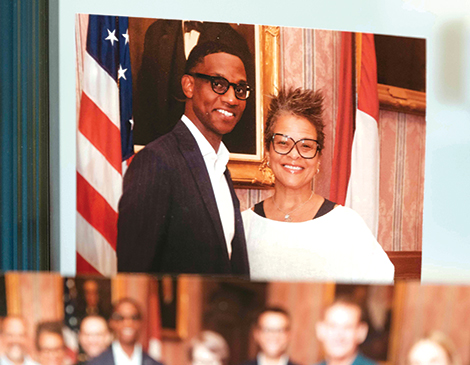
Beyond the Southeast Side Promise, there’s the Middle Neighborhoods Initiative, run by the city and Cleveland Neighborhood Progress. Jones Forbes says it’s crucial to focus on maintaining these spaces. After all, most Clevelanders live in middle neighborhoods like Lee-Harvard.
“Like many Southeast Side, East Side and primarily Black neighborhoods, it’s experienced a lot of disinvestment,” Jones Forbes says. “When dollars flow around the neighborhood, beyond the neighborhood, in suburbs, then it becomes hard to maintain what made this neighborhood great.”
RELATED: Mayor Justin Bibb on the Lakefront, Downtown Safety, Cleveland Culture and His Future Plans
The new projects aim to reverse a pattern in Lee-Harvard. Large-scale plans are underway for mixed-use developments and brand-new housing on old school sites, and a few home rehabilitations have already been completed. Middle Neighborhood funds also partially covered renovations on four local businesses, all near the Lee-Harvard intersection: Doc’s on Harvard, plus Kaba’s African and Caribbean Market, Watson’s Community Health Centre and a storefront owned by Double Platinum Properties.
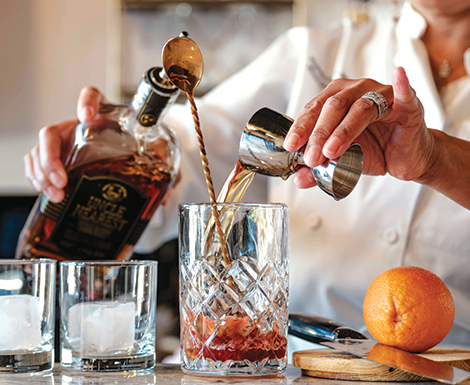
State representative Juanita Brent has lived in the Lee-Harvard community her whole life and calls this moment in time the neighborhood’s renaissance. Brent, who resides in a home four blocks away from Kolnita and Bill’s restaurant, took notice after the dramatic, swooping Doc’s on Harvard signage — a custom-lighted version of William’s “Doc” signature — was installed on the front facade. She parked her car nearby and put her face to the window of the eatery to see the construction inside. (“I’m a nosy person in the community,” she says.)
Inside, she saw an overhaul, echoing the same dramatic shifts happening all over Lee-Harvard. She saw office walls coming down, new wood flooring coming in, elegant art splashing the walls and neat rows of tables and chairs.
She started to see Kolnita’s vision, too.
“Before I even got a chance to taste the food, before I even got a chance to hear their story, before I even got a chance to know anything else, I said, ‘Oh, they’re making a real investment, and this is not just a money grab in our community,’” she says.
Doc’s on Harvard broke ground in December 2020, partnering with the Harvard Community Service Center for a storefront renovation grant to fashion a grand entrance.
But hurdles arrived almost immediately. The Walkers faced public misconceptions about their restaurant when applying for a liquor permit, with some neighbors concerned they were opening a nightclub. They discovered they had to completely overhaul and update the building’s electrical, plumbing and HVAC systems, and all on a careful budget. Building issues and out-of-date blueprints made necessary renovations an uphill battle.
Bill, a retired senior manager for Allstate Insurance, remembers rolling up his sleeves and stepping in to help complete construction work with his wife. Over the next year they tore away the interior layout, breaking down rooms and removing equipment, stripping the building to a clean slate. At one point, the two scrambled to cover the plumbing in the building’s basement as their supply of concrete started to dry.
“We’ve got a line going, throwing the buckets down, and they’re really, really heavy,” Bill recalls. “I look up, and I see her, with the buckets and a shovel, concrete dripping all over us. I don’t know of any other person besides Kolnita that would’ve done that. And she did it all out of love.”
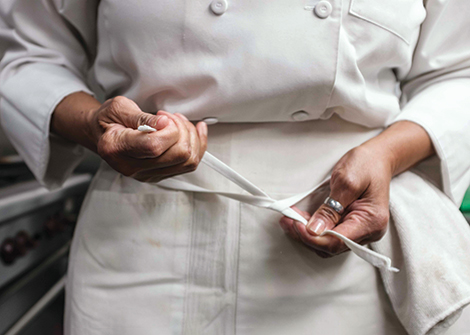
In the middle of building their dream, Bill and Konita's world crumbled around them.
The couple lost their 21-year-old son Trent to suicide, following mental health challenges with schizophrenia, in early 2022. Trent had earned a full athletic scholarship to Notre Dame College in Cleveland, coming out of the coronavirus pandemic. Kolnita and Bill saw his devastation after his first day of orientation — the shock of social reentry after pandemic isolation.
Six weeks later, in the midst of grieving his grandson, before he could see his former office building’s transformation, William Walker, the “Doc” of Doc’s on Harvard, passed away. Kolnita says he died of a broken heart.
In the darkness, Kolnita and Bill tried to make sense of the tragedies unfolding around them. They cemented their loved ones’ legacies in tangible ways: William’s, into the restaurant they were building together, and Trent’s, into Trent’s Room, a nonprofit for youth struggling with isolation and mental health challenges after the pandemic. The nonprofit has hosted healing walks, game nights and ice cream socials for local children and teens.
In their grief, they found meaning. Trent’s organ donation helped save or improve lives for more than 100 people, including a young football player who received Trent’s heart and a local church member who received one of Trent’s kidneys.
So they moved forward. It was all they could do.
“There were so many opportunities for me to fold. There were so many opportunities for me to say, ‘Oh, I can’t do this.’ That, absolutely, 100%, never crossed my mind,” Kolnita says. “Once you get a vision from God, he’s going to give you the provision to sustain and to see us through.”
Kolnita’s faith stayed steady, following the loss of her son. And Trent is honored in the space every day. He’s in the patio mural, triumphant, wearing a graduation gown — embedded in the world they’ve built at 16615 Harvard Ave.
Kolnita also sees glimpses of her son in moments shared with some of the employees she’s hired in the kitchen — a crew of young African American men from the neighborhood. “They look just like Trent,” she says. “It’s a blessing to work with them. I feel so honored.”
Family stories are very much a part of the experience when you dine at Doc’s on Harvard. On a Friday night, Bill exudes pride telling us about his father’s role as a member of the National Negro Golf Association’s Cleveland chapter and about his mother’s accomplishments as an Air Force captain and then at the Cleveland VA, where she worked with famed comic book writer Harvey Pekar.
On a December night near the holidays, it’s quiet, with just a few other customers seated at the bar.
Since it’s been open, Kolnita says Doc’s on Harvard has run at about 25% capacity, steadily gaining traction. She and Bill sustained operations through private events and catering. At this point, it’s all about getting the word out — about their restaurant, and about everything else happening in Lee-Harvard, too.
“Our personal investment dollars are real, and we are putting in all of our efforts and our passion and our hearts to bring something beautiful to the neighborhood, because Lee-Harvard really will not look like this in two to three years,” Kolnita says. “I think we’re on the precipice of something great.”
Bill refills our water glasses and gestures to photos and documents that dot the walls, including, at the main entryway, a framed black-and-white portrait of his parents — the dapper young couple, dressed to the nines in a suit and a dress, smiling and stepping down a hallway at a dentistry conference at Miami's Fontainebleau hotel.
Meanwhile, Kolnita preps in the kitchen, making each dish from scratch, much like she first learned from her mother and grandmother all those years ago. She works a lifetime of flavors into the upscale menu, found particularly in the Nana’s Southern Fried Chicken entree, served with savory collard greens, rice, gravy and a honey corn muffin — Kolnita’s twist on some of her grandmother’s specialties.
At the tail end of our meal, we hear Kolnita in the kitchen, her voice muffled. “Hands!” Bill ducks in to pick up the final dish and brings it to the table, setting it down near a flickering candle.
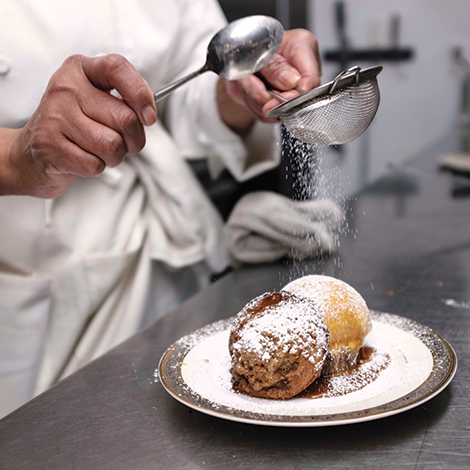
Kolnita designed the banana bread crumble with vanilla bean ice cream and butterscotch caramel after a trip to Hawaii and a fateful banana bread sundae she tasted while there.
She named her take on the dessert “A Hui Hou.” Its translation — “until we meet again” — nods to both Trent and William, who were supposed to be on that trip and whose ashes, along with Bill's mother's ashes, were spread in a Polynesian ceremony on the shores of Maui.
“Until We Meet Again.” It’s sweet — soft and warm, with a little grit; there’s a delightful crunch baked into the edges of the bread. It’s the taste of an embrace, from a chef and a family, in a neighborhood of legacies, in a restaurant of legacies.
And it tastes like home.
For more updates about Cleveland, sign up for our Cleveland Magazine Daily newsletter, delivered to your inbox six times a week.
Cleveland Magazine is also available in print, publishing 12 times a year with immersive features, helpful guides and beautiful photography and design.

Annie Nickoloff
Annie Nickoloff is the senior editor of Cleveland Magazine. She has written for a variety of publications, including The Plain Dealer, Alternative Press Magazine, Belt Magazine, USA Today and Paste Magazine. She hosts a weekly indie radio show called Sunny Day on WRUW FM 91.1 Cleveland and enjoys frequenting Cleveland's music venues, hiking trails and pinball arcades.
Trending
-
1
-
2
-
3
-
4
-
5










